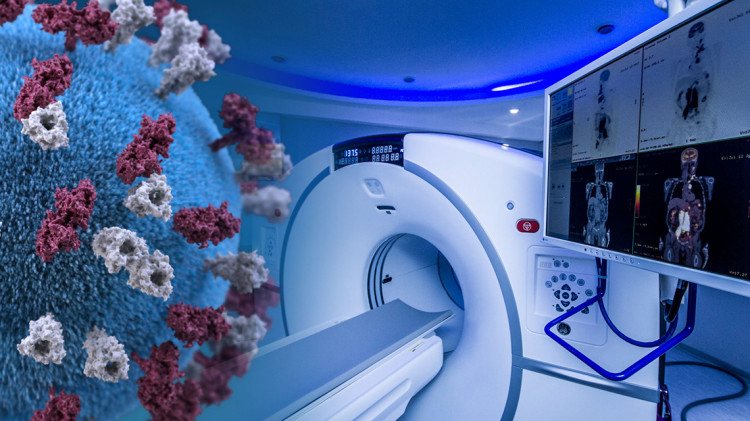The Director General of the International Atomic Energy Agency (IAEA), Rafael Mariano Grossi, warned today that the global COVID-19 pandemic is disrupting key health services to diagnose and treat chronic conditions such as cancer and heart disease, potentially putting many lives at risk, particularly in unprepared and underequipped low-income countries.
Speaking at a panel discussion at the World Health Summit in Berlin, Director General Grossi said an IAEA survey on the impact of the pandemic on nuclear medicine services showed worrisome trends. “Diagnostic procedures fell on average by more than half in the 72 countries surveyed,” he said.
The IAEA helps countries in the use of nuclear and radiation medicine to detect and treat cancers, and to manage cardiovascular diseases as well as neurological and kidney disorders, among others.
While tackling COVID-19 remains a global priority, non-communicable diseases like cancer continue to afflict millions, and their incidence continues to grow. “Services to catch and treat such diseases early should not stop,” said Grossi. “We will continue our work so that the situation does not get any worse.”
The IAEA survey, carried out in April-May and published last month in the Journal of Nuclear Medicine, showed that nuclear medicine services in both high- and low income countries were affected by the pandemic, with an average decline of 54 per cent in diagnostic procedures in 434 responding medical centres across the world.
The survey noted that pandemic-related reductions in staff and reluctance of patients to visit clinics out of concern of risking COVID-19 exposure may have contributed to the decline of procedures globally.
The use of PET/CT scans to determine the location and spread of tumours decreased on average by 36 per cent, according to the survey. Procedures to detect cancer in lymph nodes – often the first place to show the spread of the disease – fell by 45 per cent. Imaging procedures for conditions such as thyroid disease plunged by two thirds, while lung and bone scans also more than halved.
Particularly striking was a decline in cardiac studies by 66 per cent, suggesting that patients could be delaying timely medical care that could impact survival chances.
“The findings of the IAEA survey have worrying implications for patient care, as late detection and intervention can turn treatable diseases into terminal ones,” said Grossi.
The availability of key medical isotopes was also disrupted, the survey showed, mostly due to lockdowns in countries and global transport restrictions. Insufficient supplies of 99mTc/99Mo generators – devices used to extract the most used isotopes in nuclear medicine procedures – affected Latin American countries severely, followed by Asia and Africa.
The IAEA plans a second survey to assess the situation one year after the first SARS-CoV-2 cases were reported in December 2019. “We unfortunately expect to see continued disruptions in diagnostic services, and possibly increasing regional differences, as the pandemic persists,” said Diana Paez, one of the survey’s lead authors and head of the IAEA Nuclear Medicine and Diagnostic Imaging Section. “These surveys can guide us in offering strategic assistance to countries during this challenging time.”
During the pandemic, the IAEA produced technical guidance for nuclear medicine departments to continue services also during COVID-19. “The document offers information for practitioners to minimize the risk of COVID-19 infections among patients, staff and the public,” said Paez. The IAEA also provided health professionals worldwide with a wide range of resources, including webinars attended by over 2 400 participants from more than 110 Member States.
Even before the pandemic spread across the world, access to nuclear and radiation medicine were limited in many low- and middle-income countries. “One country in four does not have access to radiotherapy services, while 26 countries in Africa do not have a single radiotherapy machine. This is a scandal,” said Grossi at the virtual World Health Summit panel that included Fernando Ruiz Gomez, Minister of Health of Colombia, as well as prominent stakeholders from the private sector and leading clinical experts. “Radiotherapy is a cost-effective form of treatment for many cancers. With the right partnerships we can help and make a difference to improve the situation,” he said.


